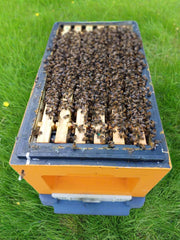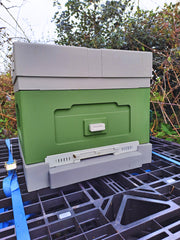How many hives should a beginner beekeeper start with in the UK?
Most beginners should start with one spring nucleus colony (nuc). As it expands, you can make a pre-emptive split into a second colony. This prevents swarming and provides a backup hive for resources and insurance over winter.
Beginner beekeeping strategy
| Stage | What happens | Why it helps |
|---|---|---|
| Start with 1 nuc (spring) | Nuc grows strongly through summer | Simpler to manage as a beginner |
| Pre-emptive split | Create a 2nd colony in the supplied poly nuc | Prevents swarming; builds insurance colony |
| Overwinter | Both colonies overwinter (main hive + nuc) | Backup in case one fails; combine if weak |
| Next spring | Decide: run 2 colonies, combine, or split again | Flexible path forward for expansion |
- Start with one nuc to learn the basics without being overwhelmed.
- Make a pre-emptive split to create a second colony and prevent swarming.
- The second colony acts as an insurance policy — for brood, eggs, or survival over winter.
- By spring, you can decide to run two hives, combine them, or repeat the process.
Related questions
- How long can you keep bees in a nuc before moving them?
- When is the best time to buy a nuc in the UK?
Next steps
Looking to begin? See our Nucs for Sale (UK), check Overwintered Nucs, and explore our Hive How-Tos guide hub for step-by-step advice on making splits and overwintering nucs.
FAQs
Is one hive enough for a beginner?
Yes. One nuc in spring is enough to learn beekeeping basics without being overwhelmed.
Why make a pre-emptive split?
It prevents swarming, creates a second colony, and provides insurance if your main hive struggles.
Can a colony survive in a poly nuc over winter?
Yes. A strong nuc can overwinter successfully in a poly nuc, ready for spring.
What if one hive fails over winter?
If one hive fails, you still have the second. If both survive, you can either run two colonies or combine them.




